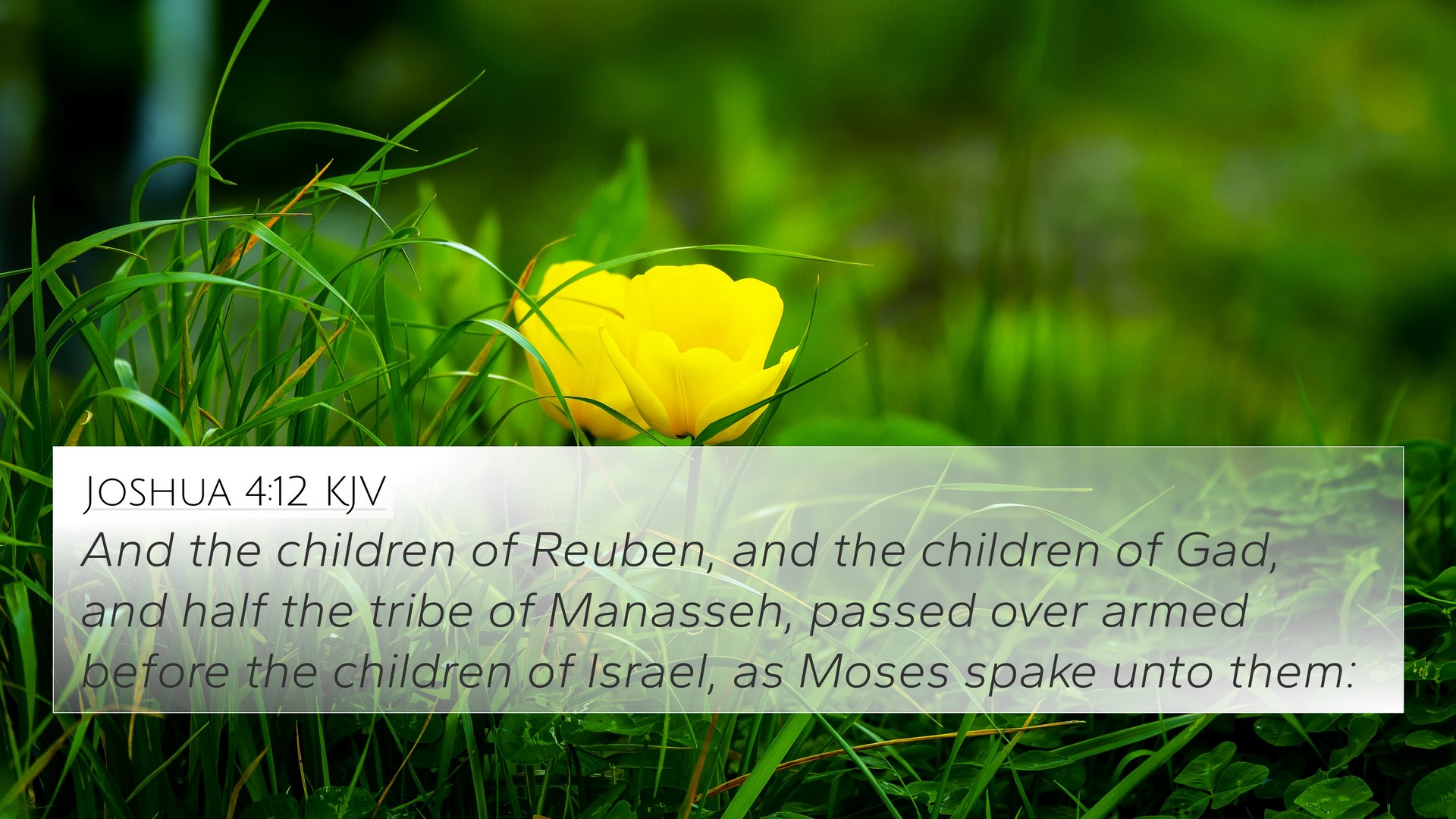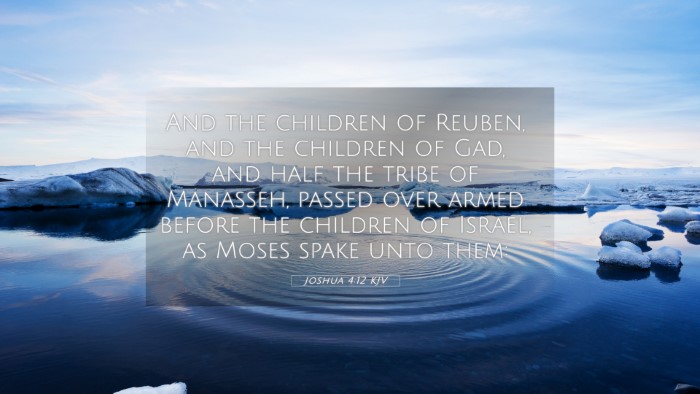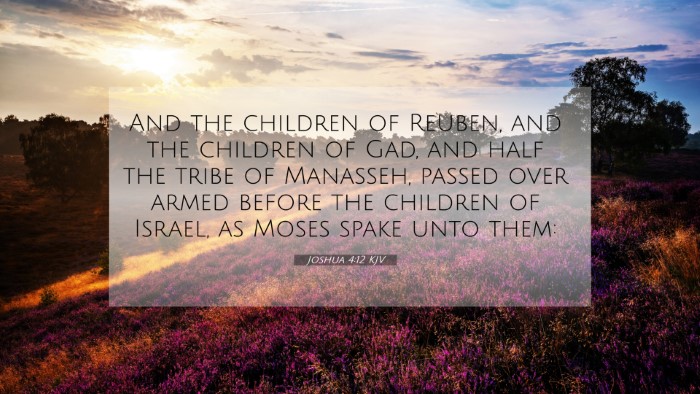Old Testament
Genesis Exodus Leviticus Numbers Deuteronomy Joshua Judges Ruth 1 Samuel 2 Samuel 1 Kings 2 Kings 1 Chronicles 2 Chronicles Ezra Nehemiah Esther Job Psalms Proverbs Ecclesiastes Song of Solomon Isaiah Jeremiah Lamentations Ezekiel Daniel Hosea Joel Amos Obadiah Jonah Micah Nahum Habakkuk Zephaniah Haggai Zechariah MalachiJoshua 4:12 Similar Verses
Joshua 4:12 Cross References
And the children of Reuben, and the children of Gad, and half the tribe of Manasseh, passed over armed before the children of Israel, as Moses spake unto them:
Uncover the Rich Themes and Topics of This Bible Verse
Listed below are the Bible themes associated with Joshua 4:12. We invite you to explore each theme to gain deeper insights into the Scriptures.
Joshua 4:12 Cross Reference Verses
This section features a detailed cross-reference designed to enrich your understanding of the Scriptures. Below, you will find carefully selected verses that echo the themes and teachings related to Joshua 4:12 KJV. Click on any image to explore detailed analyses of related Bible verses and uncover deeper theological insights.
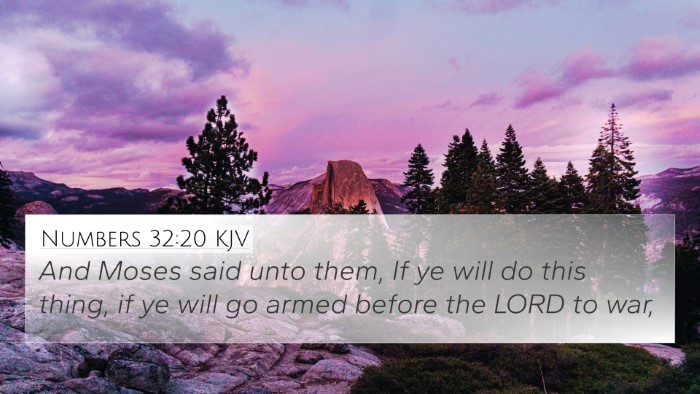
Numbers 32:20 (KJV) »
And Moses said unto them, If ye will do this thing, if ye will go armed before the LORD to war,
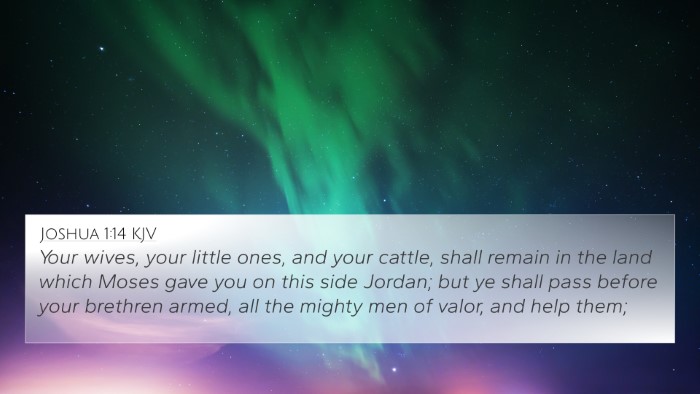
Joshua 1:14 (KJV) »
Your wives, your little ones, and your cattle, shall remain in the land which Moses gave you on this side Jordan; but ye shall pass before your brethren armed, all the mighty men of valor, and help them;
Joshua 4:12 Verse Analysis and Similar Verses
Bible Verse Meaning and Interpretation of Joshua 4:12
Joshua 4:12 states, "And the men of Reuben, and the men of Gad, and the half tribe of Manasseh passed over armed before the children of Israel, as Moses spake unto them." This verse is significant as it narrates the commitment of the tribes of Reuben, Gad, and the half-tribe of Manasseh to assist their fellow Israelites in the conquest of the Promised Land, following their earlier agreement with Moses.
In understanding this verse, we can derive several key themes that reflect broader biblical principles:
- Unity and Cooperation: The passage illustrates the importance of unity among the tribes of Israel. The collaboration of the two and a half tribes demonstrates a strong communal spirit essential for overcoming challenges.
- Fulfillment of Promises: This action signifies the fulfillment of Moses' prior instructions and agreements made; it reinforces the significance of God's promises being enacted through His people.
- Preparedness for Battle: The mention of being "armed" emphasizes the importance of preparation and readiness to engage in spiritual and physical battles as directed by God.
- Leadership and Obedience: The men obey Moses' command, which reflects the theme of following godly leaders and the necessity of obedience in the fulfillment of divine plans.
Commentary Insights:
Matthew Henry highlights the significance of these tribes’ dedication to their fellow Israelites, noting that their support was crucial for the collective effort of entering the Promised Land. He emphasizes that true loyalty manifests in action, illustrating how believers are called to support one another in faith.
Albert Barnes draws attention to the geographical positioning of these tribes. Their willingness to serve and lead the charge into Canaan before settling their own land exemplifies a selfless commitment to the greater good over individual interests.
Adam Clarke emphasizes that the military preparedness of these tribes reflects their strong faith and determination. They illustrate that while they had received their inheritance, they prioritized their responsibilities to God's people, reaffirming that individual blessings should not isolate believers from communal responsibilities.
Cross-References Related to Joshua 4:12:
- Numbers 32:29: Discusses the agreement made with Moses regarding their responsibilities in the land of promise.
- Deuteronomy 3:18-20: Provides context on the land allocation and the command for the tribes to aid in conquest.
- Joshua 1:14: Details the command of Joshua to the tribes, encouraging them to remember their vows.
- Ephesians 4:3: Highlights the call to unity in the Spirit, resonating with the communal support exemplified in Joshua 4:12.
- 2 Corinthians 5:14-15: Illustrates the concept of living for others based on Christ’s love, akin to the tribe’s actions.
- Philippians 1:27: Encourages standing firm in one spirit, reflecting the solidarity of the tribes.
- Hebrews 10:24-25: Calls for mutual encouragement among believers, similar to the support these tribes provided each other.
Thematic Connections between Bible Verses:
The themes found in Joshua 4:12 resonate throughout the Scriptures:
- The principle of mutual support as seen in Acts 2:42-47.
- Divine promises emphasizing the necessity of obedience in Hebrews 11:8-10.
- God’s instructions to His people reflected in Isaiah 41:6-7, where they are called to strengthen one another.
- Community and service echoed in Galatians 6:2, where believers are encouraged to carry one another's burdens.
This deep dive into Joshua 4:12 not only provides us with historical context but also highlights enduring biblical principles of unity, cooperation, and faithfulness across the communities of God's people. When studying such verses, it is beneficial to employ cross-referencing tools which help connect and illuminate these themes across the Bible.
Using a comprehensive Bible cross-reference system, believers can explore biblical concordance to deepen their understanding and draw parallels among various texts. This approach enriches our study and provides clarity on how different scripture pieces bind together into a coherent divine narrative.
The search for Bible verses that relate to each other can enhance our understanding of both specific themes and broader theological frameworks. It is essential to recognize how diverse sections of Scripture converge to express unified truths about God's faithfulness, the call for believer’s participation, and the overarching narrative of redemption.
In conclusion, Joshua 4:12 serves as a powerful reminder of individual and corporate responsibility in the life of faith. Reflecting on how this verse connects to others can illuminate our understanding of God's work and purposes throughout biblical history.
